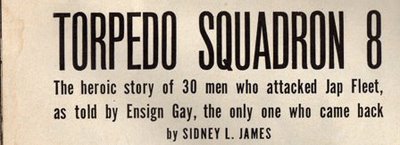
part two of an eight part series.
===
Torpedo 8 had its beginning in Norfolk, Va. in the fall of 1941, when Lieut. Commander John Charles Waldron was ordered to organize a torpedo squadron. Lieut. Commander Waldron, a seamy-faced, square-jawed native of Fort Pierre, S. D., received his appointment to Annapolis before most of the group that later became his boys were born. To start with he had some Navy-made SBN’s, turned out in 1932 and long ago obsolete. His boys were sent to him from Navy training bases at Miami and Pensacola as fast as they finished their flying lessons. Few were as experienced as Lieutenant J. C. Owens Jr., son of a Los Angeles lumber dealer, who had been a Navy pilot for six years, or Lieutenant Raymond A. Moore of Petersburg, Va., who had entered the Navy as a seaman and worked his way into Annapolis. Jimmy Owens, quiet, easy-going and serious, became Waldron’s executive officer. Moore, whose nose earned him the nickname of “Moose,” was gunnery and engineering officer, jobs that would have been given to two men had there been two to handle them. Moose, Waldron discovered, was a natural teacher and Waldron assigned him to give frequent lectures to the men. Moose liked his job and the boys liked him almost as much as they grew to revere Waldron. Soon they were all repeating his nonsensical exclamation: “Horsemeat sandwich.”
There was Ensign Grant W. Teats, the biggest man in the outfit, who came from Sheridan, Ore. and had worked in lumber camps all over the Northwest after leaving Oregon State, where he was a crack trackman. Called “Teatso” at first, Ensign Teats later acquired “Plywood” as a nickname. Once, after the war was going on in earnest and Torpedo 8 was traveling on its carrier through the battle zones of the Pacific and undergoing the tedium of standing by in daily readiness during the critical dawn hours, Ensign Texas stepped to the front of the room and brought them to attention in their reclining leather chairs by smartly tapping his pencil. “Gentlemen,” he said, “I have been informed that this organization is ignorant of the fine art of manufacturing plywood.” Then he continued for two hours with a lecture on the art, from the felling of the trees to the final product. This started an institution of regular dawn lectures.
Ensign William R. Evans of Indianapolis, who entered the Navy after leaving Harvard Law School, gave a learned lecture on the law, comparing its circuitousness with Navy red tape. Ensign William W. Abercrombie, who had worked in the packing plants of Kansas City, spoke long and earnestly of the packing business. “Abbie” was proud of Kansas City and his invariable query, when he scanned the chart and determined the position of the carrier, was: “How far are we from Kansas City?” He maintained that he wanted to be transferred some day to submarine patrol duty in Missouri.
Ensign Evans was the learned member of the group and, though his parents called him plain Bill, the boys called him “the Squire.” A true product of Harvard, he dutifully took the weight of the world on his shoulders. On Dec. 7, when the news of the Jap attack reached Norfolk, he sat down and soberly wrote to his parents as follow: “People will not realize, I fear, for some time how serious this matter is. The indifference of labor and capital to our danger is an infectious virus and the public has come to think contemptuously of Japan. And that, I fear, is a fatal mistake—today has given evidence of that. This war will be more difficult than any war this country has ever fought … once more the whole world is afire. In the period approaching Christmas it seems bitterly ironical to mouth again the timeworn phrases concerning peace on earth, good will to men, with so many millions hard at work figuring out ways to reduce other millions to slavery or death. I find it hard to see the inherent difference between man and the rest of the animal kingdom. Faith lost—all is lost. Let us hope tonight that people, big people, little people all people throughout this great country have the faith to once again sacrifice for the things we hold essential to life and happiness. Let us defend these principles to the last ounce of blood. But then, above all, retain reason enough to have ‘charity for all and malice toward none.’ If the world ever goes through this again, mankind is doomed. This time it has to be a better world.”
The Squire kept his crew haircut to the end and he was reluctant to lay aside his stovepipe-legged, high-cut Harvardian trousers after the Japs hit Pearl Harbor.
Ensign Harold J. (“Elly”) Ellison, handsome, slender and fidgety, had left a white-collar job in an insurance office in upper New York State. Ensign Ulbert M. Moore, called “Whitey” because of the silk down he had for hair, was a cherubic half-pint who became the virtual mascot of the outfit. It was said of Whitey that he could sleep on a picket fence. When he wasn’t sleeping he wore a perpetual smile and enjoyed hugely the razzing he got for his love of slumber.
===
part three continues below.
Life August 31, 1942
No comments:
Post a Comment